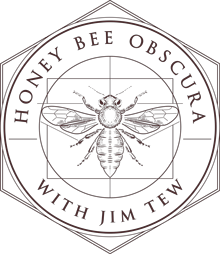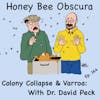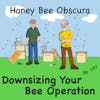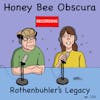Lost Queens (174)

In this episode, hosts Jim Tew and guest Anne Frey, delve into the intriguing and sometimes baffling phenomenon of beekeepers being unable to locate their hive's queen. Whether you're an experienced beekeeper or just starting, losing sight of your...
In this episode, hosts Jim Tew and guest Anne Frey, delve into the intriguing and sometimes baffling phenomenon of beekeepers being unable to locate their hive's queen. Whether you're an experienced beekeeper or just starting, losing sight of your queen can stir a mix of mystery and panic. But as Jim and Anne discuss, this situation is more common than one might think and is part of the beekeeping journey. Through their engaging conversation, they offer insights and anecdotes on the various reasons queens may become elusive and share practical advice on how to cope with and potentially resolve such situations.
Listeners will appreciate the hosts' exploration of the queen's perspective during hive inspections and the impact of environmental changes on her behavior. From the hive's disruption by light and smoke to the queen's instinctual response to protect herself, Jim and Anne cover the gamut of reasons behind a lost queen. They also provide valuable tips on searching for her, emphasizing patience, understanding the hive's dynamics, and the importance of not disrupting the colony further.
This episode is a must-listen for anyone fascinated by the complex behaviors of honeybees and the art of beekeeping. It reassures beekeepers that losing sight of the queen is a part of the natural order and, with the right approach, can be an opportunity for learning and growth in their beekeeping practice.
Listen today!
______________________
This episode is brought to you by the support of Bee Culture Magazine: The magazine of American Beekeeping since 1873! Each month, Bee Culture delivers the best information in an easy to read magazine, full of content from beekeepers, researchers and regular contributors, including Jim Tew and Beekeeping Today Podcast's, Becky Masterman!
Subscribe today at: https://beeculture.com
______________________
Thanks to Betterbee for sponsoring today's episode. Betterbee’s mission is to support every beekeeper with excellent customer service, continued education and quality equipment. From their colorful and informative catalog to their support of beekeeper educational activities, including this podcast series, Betterbee truly is Beekeepers Serving Beekeepers. See for yourself at www.betterbee.com
______________________
Honey Bee Obscura is brought to you by Growing Planet Media, LLC, the home of Beekeeping Today Podcast.
Music: Heart & Soul by Gyom, All We Know by Midway Music; Christmas Avenue by Immersive Music; original guitar music by Jeffrey Ott
Cartoons by: John Martin (Beezwax Comics)
Copyright © 2024 by Growing Planet Media, LLC

Episode 174 – Lost Eggs
[music]
Jim Tew: Hi, listeners. Hey, it happens. Sometimes when you least expect it, you simply cannot find the queen. She's not where she should be. You've looked and you've looked and she's just gone. There's a feeling that comes over you when that happens, a mystery of, "Oh, my stars. What happened?" As an experienced beekeeper or as an inexperienced beekeeper, you just have to learn to live with it. There's some things you could do, and I want us to talk about that for a while. I'm Jim Tew you here at Honey Bee Obscura.
Anne Frey: I'm Anne Frey from Betterbee.
Jim: We're both going to sit here and prod each other to have memories and thoughts and input about how we would handle not being able to find our queen under given conditions.
Introduction: Welcome to Honey Bee Obscura, brought to you by Growing Planet Media, the producers of The Beekeeping Today podcast. Join Jim Tew, your guide through the complexities, the beauty, the fun, and the challenges of managing honeybees. Jim hosts fun and interesting guests who take a deep dive into the intricate world of honeybees. Whether you're a seasoned beekeeper or just getting started, get ready for some plain talk that'll delve into all things honeybees.
Jim: It happens, doesn't it?
Anne: Yes. Sometimes, you don't know what's going on.
Jim: I've made so many jokes using the same tired old euphemisms about needles in haystacks, but the point is, in this late spring, early summer, I've got 40,000, 50,000, 60,000 bees, and I'm looking for one. I try to look at it from the queen standpoint. She was going about her business. She was having a good day. She was just putting eggs here, putting eggs there, everything was going great. She was doing it in a hot, dark, humid hive. Then, with practically no warning, smoke rolls in, and light bursts in.
Anne: Bright lights, yes.
Jim: I'm completely turned upside down, what natural organism would not run for cover?
Anne: It's good to look at it from her point of view because sometimes people don't even realize that they got to look on the brood frame, not just every old frame. If the queen doesn't run for cover, she's going to be doing her thing on a brood frame.
Jim: That cover can really be good, can it? It can be right down in the corner of the frame.
Anne: Yes, under a pile of workers, under a piece of dropped wax. She is good for hiding. Sometimes, I've found her just walking on the pallet, which is outside of the nuc or the hive, and terrible things. I'll see a clump of bees on the grass, and I'm like, "Why are they there?" It's the queen. They're clustering around the queen on the grass, and she must have dropped off a frame. It's just tiptoe around if you can't find her.
Jim: Anne, stop, stop. You're going through really good points in a hurry. [laughs]
Anne: Stop, stop.
Jim: Stop, stop. I can't keep up with all these points. The one I've got on my mind is that clump on the grass. That's always a good thing to be watching for. If you've been in a beehive and you've rummaged around and moved frames around and disturbed things. You're closing things up and shutting it down and off to one side is a clump of bees, oddly, the size of a golf ball maybe, acting weird, you need to take notice especially if you didn't find the queen in that hive.
Anne: They might be on the grass. They might be clinging to the edge under the telescoping hive coverage, something like that. Yes, just think of all that stuff. Think of everything. Just don't move, think of everything. That's the rule.
Jim: I want to make this point before, I'm going to go back to one of your other points about the queen hiding. We have to realize that this has been a major intrusion into the bees' life. That nest has really been violated. What we see as just a good day's work as a beekeeper was a major invasion from the hive's persona. Their perspective of their existence, their defense mechanism, they were completely overrun.
Anne: Besides the smoke and the brightness, what about the wind or just the change of the way their air feels?
Jim: All of a sudden, the nest is bathed in light, which is usually dark. All of their CO2 systems and their humidity systems are destroyed because we're in there. We're doing this good thing for the bees. Be prepared, watch everything because this has been a huge disruption for the colony. You haven't done it before. The thing you mentioned early on was the queen's demeanor, how she runs and hides.
Anne: Sometimes.
Jim: You said that sometimes you found her on the pallet outside. All bees do run, but maybe I'm just looking at the queen. She does seem to have a bee idea that she must be special, that she needs to be protected like the president or like the reigning monarch. She does take care of herself.
Anne: The reigning monarch, we could have a name for her The Queen.
Jim: [laughs] Yes, it is. It does work that way.
Anne: Sometimes she just does her job, but sometimes she just seems to go crazy and she runs down and over the edge.
Jim: Almost again, you're ahead of me.
Anne: Oh, sorry.
Jim: Is that a personality issue? A queen personality issue where some queens are running and flighty and others just go right about their business. While you're holding the frame right before your very eye, she deposits an egg like you're not even there.
Anne: Yes, some of them are like that. I think maybe it's a genetics thing or more a temperament thing. I don't know what to call it, but they're definitely different. Sometimes, hives are different from others, and they have a temperament. You say, "This is a good, quiet one. This is an angry one." The queens themselves are like that. We can change the way that works though. I think you could probably make even a calm, deliberate queen start running if you were using too much smoke or you were being really violent with your frame movements.
Jim: Or breathing on them. Sometimes, puffing air, you're talking to someone else, "Here's the queen. Here's the queen." You're excited, and you blow your lunchtime breath on them, I sometimes think that has an effect. Here's where I want to get with this, Anne.
Anne: Yes.
Jim: Can't find the queen. There's all kinds of reasons. She's running. She's flighty. You're not doing your job correctly. It's not surprising that she's trying to get away from you. The point of the discussion today is, we can't find her. We can't account for where she's. Right off the bat, what do you do when you're in-- Let's just put some parameters on it. When you're in a single deep 30,000, 40,000 bees, and you can't find her. You've been through the frames once or twice, what then?
Anne: Well, my first instinct would be to just close it back up. I would put all the frames where they should be. I should say that normally only one frame would be out. I don't mean to imply that there's frames all over the place. I would put the frame back in, and I would put the covers on and close it up and give it at least a half hour. Do something else for a while. I think that then she would get back to doing her thing, and you would be more likely to find her just quietly laying eggs on the brood frame when you go back.
Jim: May I guess that two things happen? One thing that happens is you let the bees calm down, and the second thing that happens is you let the beekeeper calm down.
Anne: Totally. You got to take a breath. You've already done it three times, four times, and you're starting to psych yourself out.
Jim: You didn't think it would take this long. You've got more hives to do, and you get agitated. You're looking fast.
Anne: Definitely.
Jim: It's like a bad joke, but I frequently said one of the best ways to find a queen is don't be looking for her. If you're not looking for her, she's just right there in your face all the time.
Anne: Yes, that's a great idea. I've also said that. I'm like, "Don't look and look and look at every bee. Just look gently. Loosen your eyes up and relax your eyeballs and look at the frame." You probably are going to focus on something that looks different. It might be a drone. It might be a queen. It might be a lump of wax. You're not looking, but you're looking.
Jim: Yes, you're relaxed. Speaking of being relaxed, let's take a short break. We'll come back and pick right up where we're right here.
[music]
Betterbee: Are you an experienced beekeeper, eager to try something new? Try making comb honey. Betterbee has you covered. Our range of ready-to-use systems, including Hogg halfcomb and Ross Rounds makes it a breeze to get started or craft your own cut comb right in your existing frames. With Betterbee's expert guidance, you'll soon be harvesting delicious comb honey. Explore the options at betterbee.com/combhoney.
[music]
Bee Culture: Ready to take your beekeeping skills to the next level? Dive into Bee Culture, the magazine of American beekeeping, where each month you'll get expert insights, equipment tips, varroa control strategies, and sprinkles of humor from Stephen Bishop and Ed Colby, exclusively, for Honey Bee Obscura listeners. Subscribe now @beeculture.com for just $35 a year. Use the code Podcast for a special bundle offer. Receive your hard copy delivered monthly along with full online digital access. Bee Culture, your ultimate beekeeping partner. Join our buzzing community today.
Jim: First technique, close them up, move away. Give them 30, 45 minutes to calm down. Go back, do the whole thing again. Minimal amounts of smoke, slow movements, work your way through it. What if you got a huge hive? What if you got two deeps, three supers, 60,000 or 70,000 bees, and for whatever reason, you got to find the queen?
Anne: Very different. First of all, when I start a multi-story hive like that, I separate the boxes onto things like extra covers. I don't want to be looking into one box and then it's still on the hive. I want to separate them all and then look through each box. It's like if you keep them together, you might be looking through the second deep and she's actually there, but she's run away from you and gone into the first deep down below.
Jim: You see, you got to have that beekeeper mentality, "I'll find her. I'll find her. She'll be there." She's not in that first deep. I'm surprised. I didn't miss her. She's not there, so she's in the second deep. Then you set the second deep on the first deep while you look, and lo and behold, you did miss her. Then she's running all over. You're exactly right. You don't know where she is.
Anne: I would definitely prefer to separate them before I start any looking. Also, if you found small brood and eggs in the box where you didn't find her, I would look right away in the other box in that same position in the frames. Say, it was frames three and four, you found tiny larvae and eggs. I would look in positions three and four in the other box because she's probably just run down. Right before you separated those boxes, she was on those frames. Does that make sense?
Jim: It does make sense. You're looking for the general vicinity. Can I say most of the time? I was going to say 9 times out of 10, but I shouldn't get carried away.
Anne: Most of the time.
Jim: Most of the time she's going to pretty much be in the general vicinity she should be in. There is that time where there's that clump on the bush, or where there's that queen on the pallet and she's not where she should be, but most of the time, she's going to be in her general work area.
Anne: It's too bad that we started with those panicky situations about the pallet and the grass because those are the rarities. Usually, she's just doing her job, and she continues to do her job in those areas if you didn't smoke hard and make her run. If you can't find her, it might be a situation where she's got her whole abdomen down in a cell, and if she's an unmarked queen, she doesn't look like a queen anymore when she's squatting in a cell.
Jim: She does not. You're right.
Anne: She might have her whole face and thorax, and most of her legs down in a cell because she's examining it. Then her abdomen is just like the size of a worker, and she's hard to see in that case too.
Jim: You and I have talked before, I don't want to take your timing away from you here. Maybe you're saving your comment for later, but you had an interesting story about a queen physically hiding from you, or taking a break in a drone cell. I've never heard anything like that.
Anne: I don't know if she was taking a nap or what, but I just happened to-- I was getting ready to capture her in my hand so I could mark her, and she just seemed to disappear. It was the frame in my hand. I knew she was on it. I just kept looking and looking and I realized, because she backed out a little bit, that she had face-first gone into a really deep drone cell. It was a crazy bar comb kind of drone cell situation, so it was very deep.
Maybe it was one of those deep cells that used to have honey in it, but it was huge. She just went right in. Even the tip of her tail was gone, and she took a nap. I don't know what she was doing. There's another oddity, but things like that that odd stuff happens. You might have a hole in your comb, or odd passageway and can't see bees everywhere on your comb.
Jim: They're fairly fast. One of the things about finding a lost queen is that she could be sitting stone still, but she's under a few other bees. You don't really get the image of it, or she's moving around the edge of the frame while you're looking on the other corner of the frame. Then when you flip it over, then the whole game changes, because now I got a new clump here and new clump there.
Anne: She wants to go to the dark side every time you flip it. The other thing is, not reasons you would not find her, but a way to find her is when she's not squatting down and doing something very still and quiet. If she's moving along, she leaves this emptiness behind her, like a pathway where she's pulled her way through. Sometimes, that's what catches my eye, and I'm drawn to that hallway that she's created as she pushed through everybody. Then I see her. I want to tell people, get an observation hive, and you get really used to searching for queens. At a glance in the evening, whatever you're looking at your observation hive, you get pretty good at having your eyes caught by that queen as she moves.
Jim: Look for that red in there when she's not moving. Look for those bees circling around her.
Anne: That only happens when she stays still.
Jim: We've agreed so far that she can be runny. Some queens are more flighty and runny than others. She's surprised, you've invaded her colony, so she's trying to protect herself. Who's surprised that she's not the easiest thing to find? What do you do? You've already mentioned the one that was outside. What do you do when that flighty queen is so flighty that she takes to the air?
Anne: Oh, that is flighty. Well, there's not much you can do. I have heard of somebody who saw it happening and snapped their hand out, like Mr. Miyagi and Karate Kid, and caught her gently in the middle of their fist. That is not usually going to happen. I would just wait in the same situation as bee. I said close up that hive and go away. That's pretty much what I would say to do.
Jim: Would you close the hive up?
Anne: If she was exposed at the top of the hive and flew away from that scene, I would leave it open. If it was like you getting ready with a queen cage, or something like that, and the hive was closed, I would leave it in that state. I would just get out of there, move your stuff away. Just let the smell of the hive and the normal look of the hive be the way it is, and check it the next day.
Jim: We've been arrogant about saying this, but so much as possible. We try to think like a queen. What if you're coming as a package queen, and you're being released? Suddenly, you're free, and you're gone. You take to the air. You really have no idea where you are. It's like you've just fallen out of the sky. That's why it's confusing too. Just stop everything. Don't close anything. Don't do anything else. Leave the odor feels that are there, and maybe she'll come back.
Anne: In that case, she might be attracted to the smell of that package with the bees in it, and so you should just stop and let the package sit there and observe. You might see her land on the top of a hive near you. You might see her land on a post. We saw that one time. They just seem to circle away up into the sky when I see it happen.
Jim: It's where's Waldo? For a moment, you think, "No, no, out of all the bees in the air, don't lose her, don't lose her." There's that bee and then suddenly just poof-
Anne: It's gone.
Jim: -she's gone into all that oblivion of bees that are flying.
Anne: Sometimes when I've just left things alone, she returns. Other times, you never see her again. All you can do is leave the stuff the way it is and wait for her to return and check it.
Jim: I was direct releasing queens in packages that had been held too long, and I'd gotten skittish about how long the packages had been confined or the feeder can is empty. I was directly releasing the queens on the drone comb, rainy afternoon. That queen came out like the great Satan was in the cage with her, right in the air like a bullet and gone. I waited and I waited and light drizzly rain, package queen.
Anne: Oh, that's not good.
Jim: This doesn't not look good. Left it open. Worked the other bees. Came back, closed it up. I didn't know if she was in there or not. Don't go back into it. That's bad enough. I left and I went back to my office, and maybe an hour and a half later, closer to 5:00 and quitting time, I was driving away. I just was drawn back to that hive, and I stopped by. I promise you, there she was, little clump of wet bees around her on a piece of tall grass near the colony. Near being like 2 feet away.
I think, in her own way, she was telling me how sorry she was that she had done that because this had not been a pleasant afternoon for her. I took her and I re-caged her and put her back in that colony. On the top of that colony, I wrote, "Wet Queen." I monitored that for a few months and she was accepted and her life went on. That story had a happy ending.
Anne: I bet you, she did everything right for the rest of the season to make up for that.
Jim: She was very apologetic. [laughs] Do you have any comments when they fly away? All you can do is just hope the odds are with you. How often did they come back in your case, Anne?
Anne: Honestly, I think it's 50/50.
Jim: That was exactly my number. I get them back about half the time.
Anne: I've also seen a queen that we just thought flew away, I've seen it on top of my friend's hut. It seems like you stay still, but you look on things that are high.
Jim: I've got those stories that just don't work right. You can't find her. You can't find her. You look everywhere, you can't find her. It's not that big of a colony. Why is she not here? She was just here yesterday or recently. I'm winding down here, I guess, ending on a bad note. You don't suppose, and I looked in the treads of both my boots. Then the other shoe-
Anne: No.
Jim: -there was a bright red dot of what was left of the queen pressed into my boot where she had dropped off the frame, and I'd stepped on her. These things happen, don't they?
Anne: Oh, man, that's terrible. That was a terrible way to end, Jim.
Jim: It is. It is. I was hoping you had a brighter story-
Anne: Oh, gosh.
Jim: -where was a survivor queen, where she came back heroically and it was one of the best colonies ever.
Anne: Yes. That's exactly the story I was going to tell. You must be psychic.
Jim: Well, it happens to beekeepers. It does happen. She's programmed to run. Something's under attack. Usually, she's too heavy to fly very far, so be respectful. Don't pull the center frames out first, work from the side frame, one or two. Work it over. Don't crawl her up, crush her. Be calm when you look for her. Don't breathe on the frames. Don't use a lot of smoke. Try to do anything in the world, but try to find the queen in a big colony. Life's too short.
[music]
Anne: Oh, yes. The best advice is just don't do that.
Jim: Just don't do that.
Anne: If it's a big colony, they're doing great. Why would you want to find that queen? Just look for eggs. You see eggs, you're happy.
Jim: Well, sometimes queens get lost. Sometimes you find them, sometimes you don't. Sometimes the story has a happy ending, sometimes it doesn't. Can we end that way?
Anne: Yes. Sounds like life.
Jim: [chuckles] Yes, sounds like life. I always enjoy talking to you, Anne.
Anne: Thanks, Jim. It's been a good time.
Jim: We'll do it again if you don't mind.
Anne: Sounds good.
[music]
[00:22:10] [END OF AUDIO]
New to Honey Bee Obscura Podcast?
Here are some great episodes to start with. Or, check out episodes by topic.
















